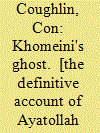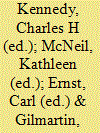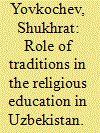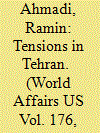| Srl | Item |
| 1 |
ID:
095443


|
|
|
|
|
| Publication |
London, Macmillan, 2009.
|
| Description |
xiv, 370p.pbk
|
| Standard Number |
9780230737136
|
|
|
|
|
|
|
|
|
|
|
|
Copies: C:1/I:0,R:0,Q:0
Circulation
| Accession# | Call# | Current Location | Status | Policy | Location |
| 054957 | 955.054092/COU 054957 | Main | On Shelf | General | |
|
|
|
|
| 2 |
ID:
047827


|
|
|
|
|
| Publication |
Karachi, Oxford University Press, 2003.
|
| Description |
xix, 390p.hbk
|
| Standard Number |
0195797760
|
|
|
|
|
|
|
|
|
|
|
|
Copies: C:1/I:0,R:0,Q:0
Circulation
| Accession# | Call# | Current Location | Status | Policy | Location |
| 047147 | 954.91/KEN 047147 | Main | On Shelf | General | |
|
|
|
|
| 3 |
ID:
127437


|
|
|
| 4 |
ID:
125214


|
|
|
|
|
| Publication |
2013.
|
| Summary/Abstract |
In its first days under the Ayatollah Khomeini, the Islamic Republic of Iran was a competitive authoritarian state that, despite challenges of war, armed opposition, and difficult economic times, enjoyed a significant measure of stability. The Revolutionary Guards and paramilitary Basij force were charged with controlling the disenfranchised masses. But Khomeini understood the importance of allowing at least two factions of the political elite to compete for power and the control of policy. The leftist clergy, organized as the Association of Militant Clerics (Majmae Rohaniyoone Mobarez), and their allies advocated for a state-run economy and trade, while the rightist clergy, organized as the Society of Militant Clerics (Jamae Rohanyete Mobarez), and their financially powerful merchants (Bazaris), campaigned for privatization and free-market economy. Both groups developed extensive, mafia-like networks and both sought to establish a crony-run economy that benefited allies and members of their clan.
|
|
|
|
|
|
|
|
|
|
|
|
|
|
|
|